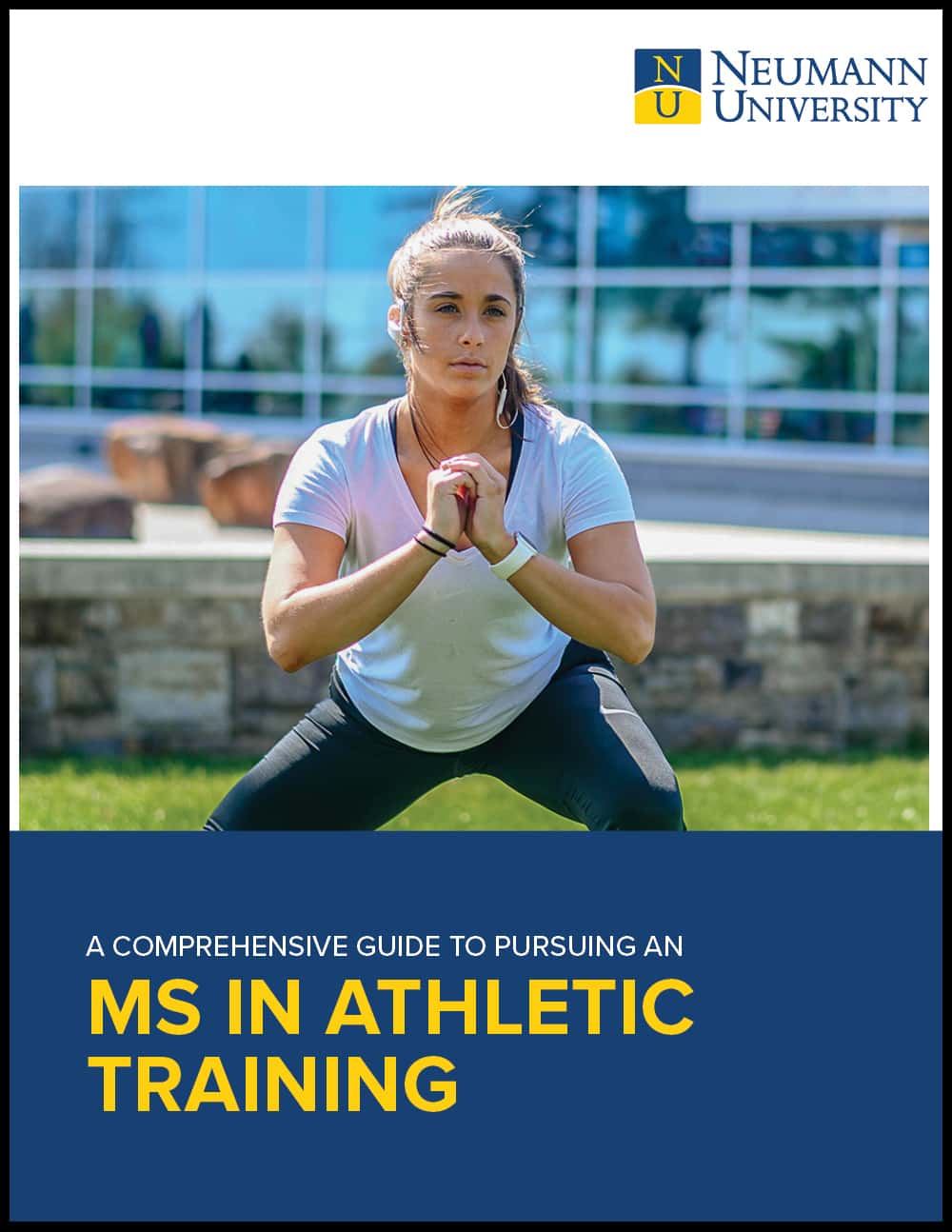 CHALLENGE
CHALLENGESummary of This Program
The MS in Athletic Training at Neumann University
MS in Athletic Training | Features
- CAATE-Accredited, entry-level athletic training program
- Hybrid course format
- All course instruction will take place in new Health Sciences Center
- Diverse clinical experience opportunities
- Intimate learning environment with a low student-to-faculty ratio
- Expert faculty with on-the-ground experience
- Elective involvement in sports medicine research
- Coursework highlights include: Advanced Functional Anatomy, Orthopedic Evaluation, Therapeutic Exercise, Pharmacology, and Sports Medicine Research
MS in Athletic Training | Learning Outcomes
- The course of study prepares students with a strong foundation in both didactic and clinical practice that is also aligned with the Commission on Accreditation of Athletic Training Education (CAATE), which are essential to professional practice as a certified athletic trainer.
- Students who successfully complete this program are eligible to sit for the Board of Certification (BOC) Exam.
MS in Athletic Training | BOC Results
MS in Athletic Training | Required Courses (43 Credits)
- ATR 530 Therapeutic Modalities (3 Credits)
- ATR 540 Therapeutic Exercise I (3 Credits)
- ATR 550 Lower Extremity Assessment
(3 Credits) - ATR 598 Practicum 1 (2 Credits)
- ATR 545 Therapeutic Exercise II (3 Credits)
- ATR 560 Upper Extremity Assessment
(3 Credits) - ATR 680 Research I (1 Credit)
- ATR 599 Practicum 2 (2 Credits)
- ATR 570 Pharmacology and Personal Health (3 Credits)
- ATR 675 Administration and Professional Prep (3 Credits)
- ATR 685 Research II (1 Credit)
- *ATR 698 Internship I (3 Credits)
- ATR 626 Special Topics in Sports Medicine
(1 Credit) - ATR 690 Research III (3 Credits)
- *ATR 699 Internship II (3 Credits)
* denotes potential for immersive clinical experience
MS in Athletic Training | Clinical Experiences
MS in Athletic Training | Faculty
MS in Athletic Training | Tuition
Tuition is based on the number of credits students are enrolled in. For more information, visit the Office of Financial Assistance.
While Neumann is known for its competitive, affordable sticker price, we know that most graduates need financial assistance of some kind while enrolled in graduate school. For everything you need to know about your financial aid options, download our guide: Offsetting the Cost of Graduate School — Financial Aid for Graduate Students.
MS in Athletic Training | Admissions Requirements
Applicants must submit official transcripts from all institutions attended, one (1) letter of recommendation from an Athletic Trainer, 20 officially documented athletic training hours, copies of First Aid/CPR certification and have completed all pre-requisites. Applicants must apply through AT-CAS.Graduate Assistantships at Neumann University
Neumann university offers a number of graduate assistantships in various offices throughout campus including residence life, campus ministry, enrollment management, student leadership & engagement, athletics, knights' pantry, the library, university advancement and so many more.Employees of partners and their immediate family members are eligible to receive a tuition discount on select graduate programs. For questions, feel free to reach out to
gradadultadmiss@neumann.edu
Program Related Current Partners:
• Riddle Village Staff and Administration
• Maris Grove
• Main Line Health
• City of Philadelphia
• Bayada Home Health Care

“I fell in love with this place because it was smaller. I had a lot of accessibility to academic resources. Help for any class. Tutoring programs led by students. It was great to make connections with professors. They did a great job catering to different learning styles. I couldn’t be happier with my time here.” - Wyatt Belotti ’24, Assistant Athletic Trainer at Palm Beach Atlantic University Athletics

Access Our Free eBook
A Comprehensive Guide to Pursuing an MS in Athletic Training
MS Sport Business Webinar | March 11 at 6:00 PM EST
MS in Forensic Psychology Virtual Information Session and Student Panel | February 27 at 4:00 PM EST
Frequently Asked Questions
What Can We Answer For You?
What is athletic training?
Certified athletic trainers are highly-qualified, skilled health care professionals that work in collaboration with physicians.
The practice of athletic training...
What is athletic training?
Certified athletic trainers are highly-qualified, skilled health care professionals that work in collaboration with physicians.
The practice of athletic training encompasses preventing, examining, diagnosing, treating, and rehabilitating emergent, acute, or chronic injuries and medical conditions in the physically active population.
Where do athletic trainers work?
Athletic trainers work with a range of patients and can assume a variety of positions in traditional and emerging clinical settings. Employment settings include but...
Where do athletic trainers work?
Athletic trainers work with a range of patients and can assume a variety of positions in traditional and emerging clinical settings. Employment settings include but are not limited to:
- High schools
- Colleges
- Universities
- Professional sports teams
- Hospitals
- Rehabilitation clinics
- Physicians’ offices
- Corporate and industrial institutions
- Law enforcement and military
- Performing arts
What is the master's in athletic training salary?
Athletic training is a field that is expanding rapidly. Due largely to an aging population as well as to a growing awareness of the seriousness of...
What is the master's in athletic training salary?
Athletic training is a field that is expanding rapidly. Due largely to an aging population as well as to a growing awareness of the seriousness of sports-related injuries, the industry is expected to grow an astounding 23 percent by 2030.
The salary that you can expect to earn as a certified athletic trainer may vary by state. If you’re a local, you may be surprised to learn that Pennsylvania employs more athletic trainers than almost any other state in the United States! In Pennsylvania, skilled professionals can earn upwards of $50,000 annually.
Job prospects in other major cities are attractive as well: In Washington D.C., athletic trainers can earn over $70,000 per year, whereas top earners Massachusetts and Connecticut make around $60,000 per year.
How many semesters is the entry-level athletic training program?
The program is completed in 5 semesters (beginning with a summer session in the first year) over two years. For a review of the suggested two-year curriculum, see the course catalog.
What are the prerequisites for the MS in Athletic Training?
There are specific prerequisites that are required for admission into the program. Complete the following prerequisite courses with a...
What are the prerequisites for the MS in Athletic Training?
There are specific prerequisites that are required for admission into the program. Complete the following prerequisite courses with a minimum grade of “C” before entering the program:
- Anatomy and Physiology (8 credits)
- Biology (4 credits)
- Chemistry (4 credits)
- Physics (4 credits)
- Exercise Physiology (3 credits)
- Nutrition (3 credits)
- Psychology (3 credits)
- Statistics (3 credits)
What does the hybrid course format consist of?
The courses in the MS in Athletic Training are taught with both an online and classroom component. This means that some of the course content will be covered via online instruction, with on-campus meetings typically occurring once a week.
What does the clinical experience consist of?
To complete the MS in Athletic Training at Neumann University, students must complete four semesters of clinical education with a minimum of 1,000...
What does the clinical experience consist of?
To complete the MS in Athletic Training at Neumann University, students must complete four semesters of clinical education with a minimum of 1,000 contact hours. There are various settings for clinical placement that include secondary schools, colleges, universities, professional sports, and clinics. It should be noted that students are responsible for any costs associated with the clinical sites and may include, but not limited to, gas, tolls, parking, and/or public transportation. Click here to view a list of our clinical sites.
What is the Job Outlook for an Athletic Trainer?
Athletic trainers are passionate about the workings of the human body. Whether working directly with professional athletes to prevent injury or...


